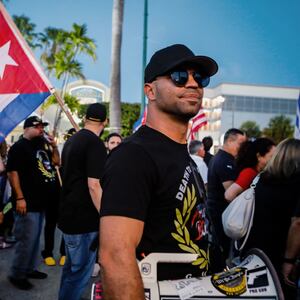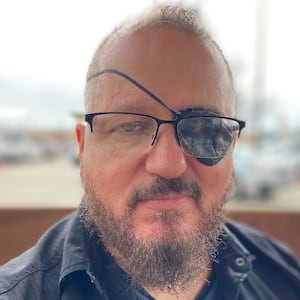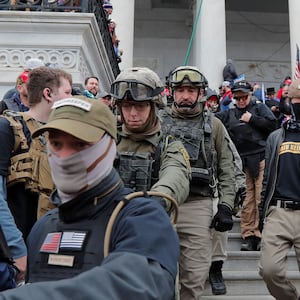Stewart Rhodes, the founder of the Oath Keepers, has the power to burn some top right-wing personalities who pissed him off. It’s unclear if he’ll actually do it.
Members of the Oath Keepers, the far-right militia group which featured prominently during last year’s attack on the U.S. Capitol, feel betrayed by the headliners of the protests that day—names like Michael Flynn, Roger Stone, and Ali Alexander. According to the Oath Keeper’s lawyer, those organizers of the Jan. 6, 2021, rally asked the militia to stand guard for them on that fateful day.
If that’s really the case, it could introduce even more culpability for those GOP figures.
ADVERTISEMENT
But Rhodes hasn’t decided yet whether he’ll answer questions at his upcoming testimony before the Jan. 6 committee, according to a person familiar with this thinking.
Rhodes was slated to appear before the House panel in a closed-door hearing this week, according to an attorney with direct knowledge of the arrangement, but the testimony was postponed for unclear reasons. If and when Rhodes does appear, though, he could shine a light on a number of key questions for investigators. Rhodes has information about the planning, coordination, and intent of organizers, as well as any possible preparations for violence and connections to government officials.
Rhodes has floated the idea of asserting his Fifth Amendment right against self-incrimination, because he spoke with FBI agents last year about rally organizers and speakers, according to an attorney representing the militia group.
Even if Rhodes—a Yale-educated lawyer—does decide to answer questions, there’s no guarantee he will clear much up for the House committee. He may even cloud things further.
First, investigators will have to wade through a sea of conspiracies and anti-government paranoia to mine the facts from Rhodes’ testimony. Compounding that task, in the year since the attack a number of fractures have appeared between different Jan. 6 factions, and the shifting allegiances have given a slew of already unreliable narrators incentive to turn on each other.
House investigators may find Rhodes ready to push all the blame onto far-right conspiracy theorists who gained notoriety during the Trump era—most specifically disgraced army intelligence general turned QAnon shill Michael Flynn, Republican strategist Roger Stone, and “Stop the Steal” organizer Ali Alexander. Two of those men have already been convicted of lying to the government, and the third, Alexander, testified before the House committee last month.
Kellye SoRelle, a Texas attorney representing the Oath Keepers, has repeatedly pointed to a rival militia called 1st Amendment Praetorian, which she alleged has close ties to Flynn, Stone, and Alexander.
“They were directing them, asking them to come provide security,” SoRelle told The Daily Beast. “All paths lead to Flynn… he’s the one who was the puppet handler for everything. He was moving all the pieces.”
SoRelle spoke alongside Rhodes at a Jan. 6 event in Washington and said she has cemented ties with him in the year since.
Still, Rhodes, who gathered with other militia members near the Capitol on Jan. 6, will face questions about the dozens of Oath Keepers—outfitted with military uniforms, tactical gear, and body armor—who were present while a violent mob staged an attack on Congress.
Rhodes and his anti-government militia, which has regional chapters of armed citizen-soldiers across the country, both received a subpoena in November from the bipartisan House committee investigating the insurrection. A letter signed by committee chair Rep. Bennie G. Thompson (D-MS) demanded that Rhodes and the group turn over documents by Dec. 7, and ordered Rhodes to testify a week later.
The committee telegraphed its intention to ask Rhodes about his organization’s role in the lead-up to the attack, as well as its willingness to engage in armed combat against fellow American citizens.
“You repeatedly suggested that the Oath Keepers should, or were prepared to, engage in violence to ensure their preferred election outcome,” the committee wrote in its letter, requesting Rhodes to testify behind closed doors on Dec. 14.
However, that meeting was rescheduled to early January, according to SoRelle.
The Oath Keepers maintain that its members were peaceful. The militia says members only attended to provide security in a volunteer capacity. But multiple members entered the Capitol, and the group’s presence outside was widely perceived as a paramilitary show of intimidation in support of insurrectionists who sought to impede Congress from certifying Joe Biden’s presidential victory.
Rhodes, who earlier this week was subpoenaed to testify in the trial of another Oath Keeper official facing Jan. 6 charges, will no doubt be pressed about his group’s true intentions on that day. It could prove especially tricky in light of Oath Keeper ties to legal efforts to overturn the election, both ahead of and after the riot.
The day before the insurrection, Rhodes and SoRelle each signed onto an “invincible” legal argument challenging the validity of the election put forward by former Stone associate and right-wing media personality Jerome Corsi.
And in the weeks after the insurrection, Rhodes and a number of Oath Keepers appeared as defendants in a bizarre federal lawsuit proposing that the U.S. government be put into a receivership styled after the mythical kingdom of Gondor, from The Lord of The Rings.
SoRelle was an attorney on the Gondor lawsuit, but pleads ignorance about that particular proposition, which she derides and blames on the lead counsel in the matter. The effort quickly fell apart.
House investigators might also explore the bad blood between the Oath Keepers and 1st Amendment Praetorian (1AP), which the Jan. 6 panel also targeted in a subpoena. SoRelle said that 1AP’s leader, Robert Patrick Lewis, as well as a rally organizer, Alexander, had exchanged messages with Rhodes on the encrypted app Signal.
“They coordinate everything. They wanted to provide security details. They claimed they had all these politicians from Florida and they needed security,” SoRelle said, claiming 1AP is “100 percent” tied to Flynn.
SoRelle recalled that her own first encounter with 1AP took place at a rally in Atlanta shortly after the election, where the group was providing security. “They were so stealthy. They were there with Ali [Alexander],” she said.
SoRelle has also sought to create distance from Oath Keeper and Stone bodyguard Joshua James, who was hit with conspiracy charges in April for his alleged role in the Capitol attack. James, SoRelle claims, was more closely tied to 1AP.
Although several sources inside the Jan. 6 Committee have told The Daily Beast that the congressional panel is being careful to not coordinate actions against insurrectionists with the Department of Justice—perhaps to avoid seeming like it’s just an extension of the Biden administration—federal law enforcement might already have the answers the panel is looking for.
Rhodes has spoken at least once with federal agents in connection with an ongoing investigation into the group’s actions during the insurrection. And while he previously said he expected to be arrested, he has not—while more than 20 other members of his group have been hit with criminal charges in connection with the Capitol attack.
According to SoRelle, the DOJ pulled a mountain of evidence from Rhodes’ cellphone back in May, when FBI agents caught up with him outside a hotel in downtown Lubbock, Texas. During an hours-long interview—which Rhodes consented to against the advice of counsel, The New York Times reported—the militia leader was grilled about his role coordinating the Oath Keepers mission on Jan. 6, SoRelle said. The FBI returned the phone three weeks later, she added.
SoRelle, who has also spoken with federal investigators, had her own phone confiscated in late August, but does not anticipate charges. HuffPost reported that the warrant for her phone referred to a code in U.S. law for “seditious conspiracy.”











